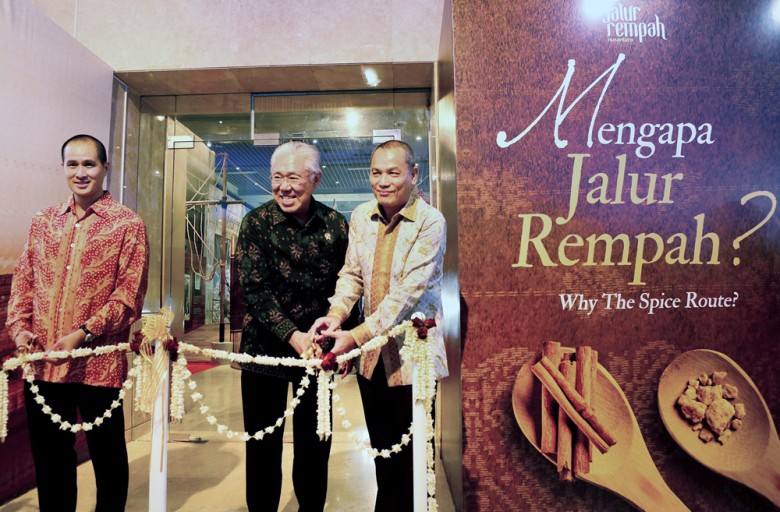Popular Reads
Top Results
Can't find what you're looking for?
View all search resultsPopular Reads
Top Results
Can't find what you're looking for?
View all search resultsSriwijaya role model for Indonesian development
To inspire the public through our historic role models, PT Jalur Rempah Nusantara officially opened on Friday an exhibition called “Kedatuan Sriwijaya: the Great Maritime Empire” at the National Museum in Central Jakarta.
Change text size
Gift Premium Articles
to Anyone
 Back to the future: Trade Minister Enggartiasto Lukita (center), accompanied by PT Jalur Rempah president director Luki Wanandi (left) and director Liliek Oetama, opens the Jalur Rempah (spice trail) exhibition at the National Museum in Jakarta on Friday. The exhibition, themed “Kedatuan Sriwijaya: The Great Maritime Empire,” will run until Nov. 28. (JP/Seto Wardhana)
Back to the future: Trade Minister Enggartiasto Lukita (center), accompanied by PT Jalur Rempah president director Luki Wanandi (left) and director Liliek Oetama, opens the Jalur Rempah (spice trail) exhibition at the National Museum in Jakarta on Friday. The exhibition, themed “Kedatuan Sriwijaya: The Great Maritime Empire,” will run until Nov. 28. (JP/Seto Wardhana)
“Unhappy the land that is in need of heroes,” the late German poet and playwright Bertolt Brecht once said.
Fortunately, while many observers have lamented a paucity of positive role models in contemporary Indonesia, we could actually learn a lot from the success stories in the vaults of our own history.
To inspire the public through our historic role models, PT Jalur Rempah Nusantara officially opened on Friday an exhibition called “Kedatuan Sriwijaya: the Great Maritime Empire” at the National Museum in Central Jakarta.
The exhibition, which runs from Nov. 4 to 28, concludes the company’s Jalur Rempah (spice trail) program on the history of the Indonesian spice trade, which reached its peak when European traders arrived during the 15th and 16th centuries.
The program comprises journalistic reports, television programs as well as the launch of a documentary film titled Banda, the Dark Forgotten Trail.
During the exhibition, visitors will get information on one of the peaks of Indonesian civilization marked by the glory of Sriwijaya in South Sumatra, which served as an international spice trade hub from its rise in the early seventh century until its decline around the 12th century, so that they can be motivated to develop the nation to reach new heights.
The exhibition features historical evidence, archaeological relics as well as contemporary visual artworks comprising paintings and installations. It will also present panel discussions on the subject of Indonesia’s past, present and future.
Historian JJ Rizal said history had helped shape the nation, from its national identity to language, through hundreds of years of global cultural exchange.
Read also: Jalur Rempah Nusantara: How Sriwijaya once served as beacon for interreligious harmony
Trade Minister Enggartiasto Lukita said at the opening of the exhibition that Indonesia should accelerate its spice production and exports to live up to the glory of its old days. The price of local pepper as a commodity, for instance, has reached a new low, according to the minister.
“We now lag behind Singapore in terms of spice exports, which is ironic because we are a great spice producer; Singapore buys the raw materials from us and while they become famous as an international spice exporter, we no longer get added value [from the global spice trade],” he lamented.
“Therefore, starting from today, we will learn from history [through the exhibition] and we [in the Trade Ministry] will up our ante in managing the Indonesian spice trade to boost the price of commodities that are endemic to Indonesia,” he said.
Coordinating Maritime Affairs Minister Luhut Pandjaitan, meanwhile, said that the current government’s effort to boost Indonesia’s spice trade and economic growth in general through intensive infrastructure building was in line with the spirit of Sriwijaya’s glory.
“We, however, have to sacrifice [our comfort] for a few years before the projects [particularly transportation infrastructure] come to fruition, which will not happen overnight,” he said, referring to complaints about traffic congestion caused by simultaneous transportation infrastructure projects in Jakarta.
Luhut said that once the projects had been completed, Indonesia would be able to cut its transportation costs down from the current 14.1 percent to around 7 to 8 percent, which will contribute to economic growth.
He added that the projects also sought to create economic equality, not just focusing on the islands of Sumatra and Java but also across Indonesia to boost trade, economic growth and price stability.










